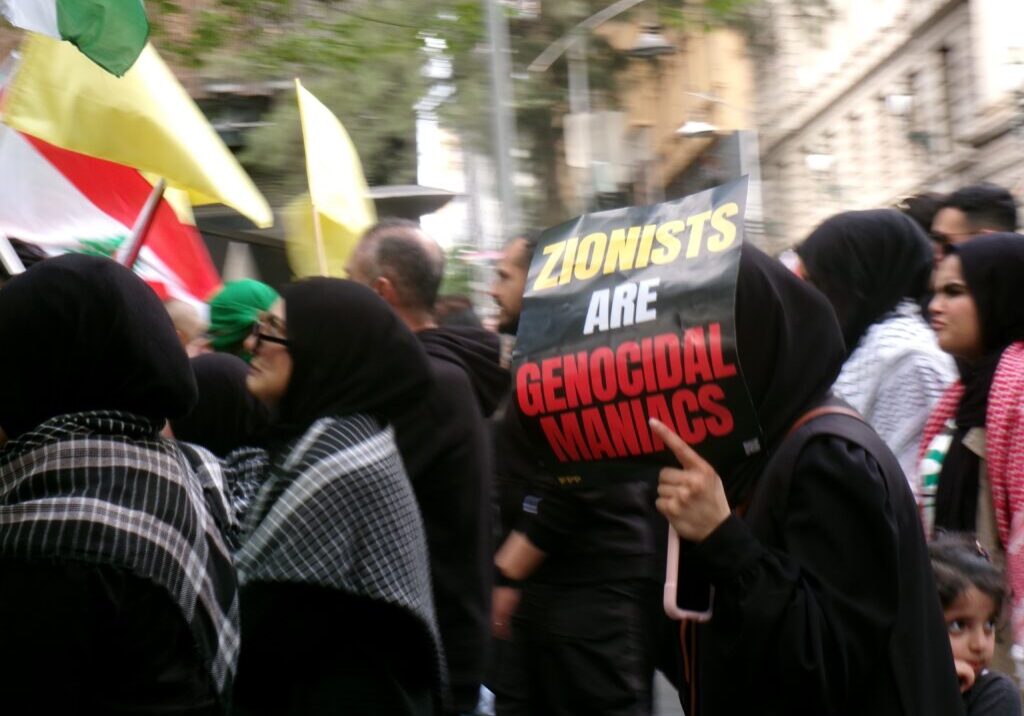Australia/Israel Review
Deconstruction Zone: Rundle’?s Factual Fumble
Dec 1, 2006 | Ted Lapkin
Ted Lapkin
Readers might recall the stoush I had in Crikey.com some months ago with leftist Arena magazine editor Guy Rundle. My rumble with Rundle was triggered by a piece he wrote that accused the mainstream Zionist Haganah militia of masterminding the King David Hotel bombing in July 1946.
When I challenged Rundle’s version of events, he trundled out some supporting material from the internet. And he later cited a few works of popular history that mention the King David affair in passing.
But the thesis advanced by Rundle intrigued me sufficiently to warrant a search beyond secondary sources or the dubious offerings of the worldwide web. In pursuit of definitive information, I contacted the Haganah archives in Tel Aviv with a request for any original documents that might pertain to this question. After a lengthy wait, I finally received a packet of Hebrew language documents that largely validated my view while impeaching Rundle’s thesis.
But first: some background.
The attack on the King David is often presented as ‘Exhibit A’ in the anti-Zionist case against Israel. After all, goes the argument, if the Jews engaged in terrorism during their struggle for national liberation, who are they to criticise the Palestinians for doing the same?
But in 1946, the King David Hotel served as British Army HQ; a fact that transformed it into a legitimate military target according to the laws of war. And the attackers telephoned a warning in an attempt to minimise casualties. By contrast, Palestinian suicide bombers deliberately seek to inflict death on Israeli civilians in cafés, shopping malls and restaurants.
Throughout WWII, the Haganah fought in concert with the UK against the greater Nazi foe. And as the war ended and the enormity of the Holocaust became apparent, Jewish leaders hoped that Great Britain would soften its restrictive immigration policies in Palestine.
But in late 1945, the Attlee government deployed the Royal Navy to prevent death camp survivors from making their way to the Land of Israel. And as a result the central Zionist establishment – and its Haganah militia – took up arms against the British Mandate.
And this turning point in policy leads to the substance of my first dispute with Guy Rundle. In October 1945, the mainstream Haganah entered into an alliance of sorts with two splinter Jewish militias, the Irgun and Lehi.
Rundle contends that this ‘Hebrew Resistance Movement’ (HRM) was an intimate arrangement in which the three Zionist undergrounds fought in close concert against Great Britain. But Haganah commander, Yigal Allon tells a different story. “The joint resistance movement did not manifest itself at the operational level,” said Allon. “Our [Haganah] operations and theirs [Irgun/Lehi] took place in different sectors and there was no operational contact.” And the testimony of other senior Haganah leaders paints a similar picture of superficial coordination between autonomous groups.
After nine months, the Haganah unilaterally dissolved the HRM in the wake of the King David Hotel bombing. And this juncture in history brings us to the gravamen of Guy Rundle’s argument. He maintains that the King David attack was carried out by the Irgun at the behest of the Haganah. But Rundle’s superficial treatment of complex historical sources causes him to go seriously astray.
It is true that the joint “X Committee” of the three underground movements approved, in principle, an attack against the British military headquarters at the King David. But the actual Irgun bombing that took place on 22 July 1946 was conducted against the express instructions of the Haganah.
Yisrael Galili, the Haganah Chief of Staff, later testified that the King David plan originated with the Irgun’s Menahem Begin, not with Haganah operations chief Moshe Sneh as Rundle claims. Galili further stipulated that Haganah approval for the operation was contingent upon the attack taking place outside working hours in order to prevent civilian casualties.
And the King David operation should have never taken place at all because the Haganah command issued a cancellation order well in advance of its execution.
Two weeks before the attack, World Zionist Organisation President Chaim Weizman demanded the immediate implementation of a moratorium on Jewish attacks against the British. In handwritten testimony, Moshe Sneh wrote that the Haganah accepted Weizman’s edict, but he implied that the Irgun and Lehi rejected it.
“The Palmach (the elite branch of the Haganah) accepted this mandate,” wrote Sneh, “and after issuing this order I then left for Europe.” His silence on the question of the Irgun/Lehi reaction to Weizman’s ultimatum is quite significant.
We do not know with certainty what was said at that fateful meeting held in mid-July 1946 between Moshe Sneh and Menahem Begin. Begin subsequently claimed that he was never explicitly told of the ceasefire order. But Galili and other senior Haganah commanders thought it inconceivable that Sneh did not convey this instruction in imperative terms.
Thus the primary source material strongly indicates that the King David bombing was conducted in spite of the Haganah’s wishes, not because of them.
Some might view this as nothing more than a tedious tussle about an obscure item of history. But there is method to Guy Rundle’s madness. While the tools of his trade might be of 1946 vintage, his agenda is decidedly 21st century.
By tainting mainstream Zionism with the terrorist mark of Cain, Rundle means to impugn the moral legitimacy of its creation — the State of Israel. And in the eyes of the radical Left, an illegitimate Jewish state born in original sin deserves every suicide bombing inflicted upon it.
![]()
Tags: Anti-Zionism






